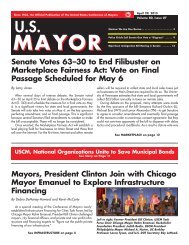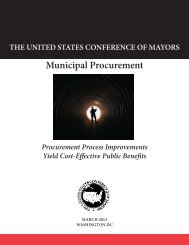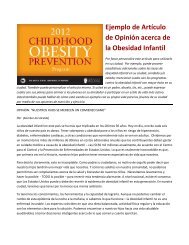Writing Proposals for HIV/AIDS Prevention Grants - U.S. Conference ...
Writing Proposals for HIV/AIDS Prevention Grants - U.S. Conference ...
Writing Proposals for HIV/AIDS Prevention Grants - U.S. Conference ...
Create successful ePaper yourself
Turn your PDF publications into a flip-book with our unique Google optimized e-Paper software.
16 TECHNICAL ASSISTANCE REPORTS March 20035. Evaluation PlanThe purpose of the Evaluation Plan isto describe how you will assess theextent to which your project has metits goals and objectives.The evaluation of <strong>HIV</strong> prevention projects is receivingincreasingly more attention–particularly from federaland state agencies. More and more, funders want toknow not only how a project was carried out (processevaluation) but also what effects it had on the clients(outcome evaluation). Even if an evaluation is notrequired (some funders just ask <strong>for</strong> occasional progressreports) it is a good idea to do one because it shows thatyour organization cares about the quality and impact of itsprojects. Evaluation has a number of benefits. It can help:• determine if the project goals and objectives are being met;• ensure that the activities in the work plan are beingfollowed closely and on schedule;• provide corrective feedback to staff that will increaseprogram quality and effectiveness;• gather in<strong>for</strong>mation about the effects of the project onthe target population;• provide evidence of project achievements;• provide evidence to potential funders of the organization’sability to run successful projects; and• help with internal administrative planning.That being said, evaluation can be challenging,particularly <strong>for</strong> small organizations with limited fundsand capacity to conduct evaluation. However, by takingadvantage of existing evaluation technical assistanceand resources and free or low-cost evaluation expertise,conducting an evaluation of an <strong>HIV</strong> prevention projectis feasible, even <strong>for</strong> organizations with modest resources.Some state and city health departments offer assistancein evaluation design and implementation and free orlow-cost evaluation workshops are frequently offeredlocally or at national conferences. In addition, evaluationexperts are sometimes willing to conduct evaluation freeof charge as a <strong>for</strong>m of community service and graduatestudents with an interest in evaluation may be willing tolend a hand to fulfill degree requirements.Basic Types of Program EvaluationThere are many types of program evaluation, morethan can be discussed adequately in this short publication,but <strong>for</strong> purposes of evaluating small, community-based<strong>HIV</strong> prevention projects, the most commonly used areprocess and outcome evaluations (<strong>for</strong> more comprehensivein<strong>for</strong>mation on evaluation, see USCM’s publication“Evaluation <strong>for</strong> <strong>HIV</strong>/<strong>AIDS</strong> <strong>Prevention</strong> Programs.”)Process EvaluationDefinitionProcess evaluation examines the implementation ofa project. It documents what services were delivered,how they were delivered, and who received them. Thisin<strong>for</strong>mation can be used to determine how well the projectwas managed, provide valuable feedback to project staff,and demonstrate to funders that the activities promisedin the proposal were delivered in the manner describedin the proposal. Of the two types of evaluationdescribed here, process evaluation is generally the easierto conduct because it relies on in<strong>for</strong>mation that is fairlyeasy to obtain, that frequently already exists, and thatcan be built into regular project activities.Types of questions asked in process evaluation• How many clients were reached by the intervention?(e.g, how many individuals were contacted during streetoutreach, how many attended each prevention workshop?)• What was the demographic profile of the clientsserved? (e.g, race/ethnicity, gender, age, <strong>HIV</strong> risk factor,<strong>HIV</strong> status, etc.)• What type of services were provided? (e.g., condomdistribution, prevention case management counseling,<strong>HIV</strong> testing counseling, prevention workshops)• How many times were the services provided? (e.g.,number of condoms distributed, number of: streetoutreach contacts made, number of referrals to <strong>HIV</strong> testing,number of one-on-one counseling sessions held)• How much time was involved in providing each service?(e.g., minutes spent on each street outreach encounter,duration of each prevention workshop)The United States <strong>Conference</strong> of Mayors • 1620 Eye Street,NW • Washington, DC 20006 • (202) 293-7330www.usmayors.org/uscm











